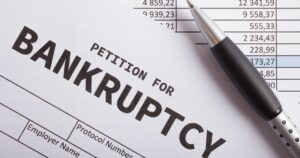Reaching a point where you feel financially out of control is challenging, but bankruptcy proceedings provide hope. If you are considering this step, knowing what to expect and how it might help you is crucial.
From understanding the different types of consumer bankruptcy to knowing how bankruptcy will affect your financial well-being, this guide will walk you through the bankruptcy process, so you can decide if it is the solution to your financial challenges.
Declaring Bankruptcy Frees You from the Pressure of Creditor Calls
If you are considering filing for bankruptcy, you likely have creditors regularly calling demanding payment. These calls create a stressful situation, and you can declare bankruptcy to put a stop to them.
When you have bankruptcy protection in place, the courts place an automatic stay on your debts. The stay blocks creditors from trying to collect, and it will stop:
- Creditor calls
- Money from coming out of your bank accounts
- Garnishment of wages
- Collection of assets used in security for the debt
Once the automatic stay is in place, the courts will work with your creditors to determine the next steps, but your immediate frustration tied to collection actions will stop.
Chapter 7 Bankruptcy Protection Removes Most Debt
Chapter 7 bankruptcy is one of the two types of consumer bankruptcy protection. This bankruptcy, also known as liquidation bankruptcy, asks you to sell many of your assets in an attempt to pay your creditors. State laws add protection for certain types of necessary assets, such as:
- Your house
- Your car
- Retirement accounts
After the asset liquidation, the courts forgive most of your debts, giving you the chance to start over.
Chapter 7 Bankruptcy Requires the Means Test
To file Chapter 7 bankruptcy, you must pass the means test. This test compares your income to the median income of your state. As long as you do not earn more than that figure, you can file Chapter 7. Keep in mind that states offer exemptions that can lower your income threshold, so discussing your income with an attorney to determine if you qualify is worthwhile.
Understand How to File Chapter 7 Bankruptcy
If you decide that Chapter 7 bankruptcy is right for you, you will contact an attorney to fill out a packet of paperwork that includes the bankruptcy petition. The paperwork will include listing your exemptions, which are assets protected from this process, and your debts. Once you file, the automatic stay begins, stopping the creditor’s call. Your creditors have a chance to argue their cases, if they wish, and then the courts can discharge your debts.
While you can file this paperwork without an attorney, it is complex. Overlooking any part or failing to list the proper assets or all of your debts increases your risk of having the bankruptcy denied or failing to discharge all eligible debts. An attorney can guide you through the process to avoid costly mistakes.
Chapter 13 Bankruptcy Protects Assets
If you file Chapter 13 bankruptcy, the bankruptcy courts put you into a repayment plan spanning three to five years. The courts reorganize the debts, allowing you to pay them off with a more manageable monthly payment. You do not have to sell your property to satisfy your debts with this plan.
The repayment plan takes into account your income and your assets. If you stay on top of the monthly payments, your creditors cannot take other action against you. If you fail to comply, they can come after your assets.
Understand How to File Chapter 13 Bankruptcy
Chapter 13 is more complex than Chapter 7, and it requires the oversight of an attorney. For this process, first, you must sign up for credit counseling, then find an attorney. The attorney will ensure you fill out the complex Chapter 13 paperwork correctly.
To fill out the paperwork, gather information about your finances and fill out the paperwork. Submit this packet to the courts, who will then assign a bankruptcy trustee to your case. Within the first 14 days, you must submit your proposed payment plan to the trustee, and start paying it within 30 days of filing, even if the courts have not yet approved it.
At some point between 21 and 50 days, your creditors will meet with the trustee to discuss their concerns. By 45 days after this meeting, your trustee and creditors will meet in court to settle on the payment plan. You will spend the next three to five years adhering to the repayment plan, after which time remaining debts get discharged when the repayment period is over; you must attend a debtor education course to help you stay out of debt in the future.
Declaring Bankruptcy Impacts Your Credit Score
Filing for bankruptcy shows that you are no longer staying on top of your debts, and the action does impact your credit score.
If you declare Chapter 7 bankruptcy, the bankruptcy stays on your credit report for up to 10 years. It has a significant impact at first, but this impact lessens as you start rebuilding your credit file and recovering from bankruptcy.
Chapter 13 bankruptcy also harms your credit score. That said, it only stays on your record for up to seven years and has less of a negative impact since you are repaying your debts through the court-ordered repayment plan.
Getting approved for credit is a challenge after you declare bankruptcy. Lenders who are willing to work with you to get credit often have higher interest rates and other unfavorable terms on the loans they offer. You will need to find lenders who work with people who have bankruptcy on their records.
Credit ratings do put more of an emphasis on new information, so making positive changes after filing can help you rebuild your score with time. The bankruptcy will be on your report, but you can start improving it even while recovering from the bankruptcy.
Bankruptcy Filings Are Part of the Public Record
Another consideration to make before filing bankruptcy is whether you want bankruptcy on your public record. Bankruptcy proceedings become part of the Public Access to Court Electronic Records (PACER).
PACER is a system attorneys and creditors will use to look up information about bankruptcy. It is available to anyone who wants to check it, but most people do not choose to review bankruptcy records. Some local newspapers will publish public notices that include bankruptcy information.
The other way people can see this information is if you give them access to your credit report, which may happen with potential:
- Employers
- Landlords
- Creditors
You will know ahead of time if these individuals check your credit because you will permit them to do so.
You Can Still Get a Job if You Declare Bankruptcy
Bankruptcy is part of your credit score, and about 29% of employers run credit checks before hiring someone, according to Experian. Bankruptcy’s negative effect on your credit can impact your ability to get a job, but it does not mean you will never get hired.
Businesses in the financial sector are particular about whom they hire in regard to bankruptcy. They also want to find people who are not under financial stress because that can increase the risk of theft or fraud. These companies are likely to run a credit check.
Other employers will only run a criminal background check. This check does not include your bankruptcy. Thus, you can get a job after declaring bankruptcy, but it may be more challenging if you want to work in the financial sector.
Bankruptcy Does Not Discharge All Debts
The main goal of bankruptcy is getting a handle on your debts, and in Chapter 7, that involves discharge. Debts may also get discharged at the end of Chapter 13 repayment plans if you are unable to repay them fully. However, not all debts can get discharged in bankruptcy.
Specifically, you cannot discharge:
- Debts you did not include in your bankruptcy petition
- Most types of taxes
- Child support or alimony payments
- Student loan debt
- Money owed to government agencies
- Fines and penalties charged by courts for criminal actions
- Personal injury debts that come from drunk driving charges
Other types of debts, like credit cards, are usually discharged. That said, if the creditor successfully proves that you used the card or loan for unnecessary luxury goods worth over $650 in the days just prior to filing bankruptcy, then the courts may refuse to discharge them. Running up charges in this way is fraudulent use of the bankruptcy protection process.
Debt Is Overwhelming, but Bankruptcy Can Help
Being in overwhelming debt is difficult. If you face this situation, both Chapter 7 and Chapter 13 provide solutions. Bankruptcy may not discharge all debt, and it does impact your credit score for many years, but it also places an automatic stay on your debts, so the creditors stop calling. By understanding your options, you can make an informed choice about your debt.
Before you file for bankruptcy, reach out to a qualified bankruptcy lawyer for personalized help with the process.

